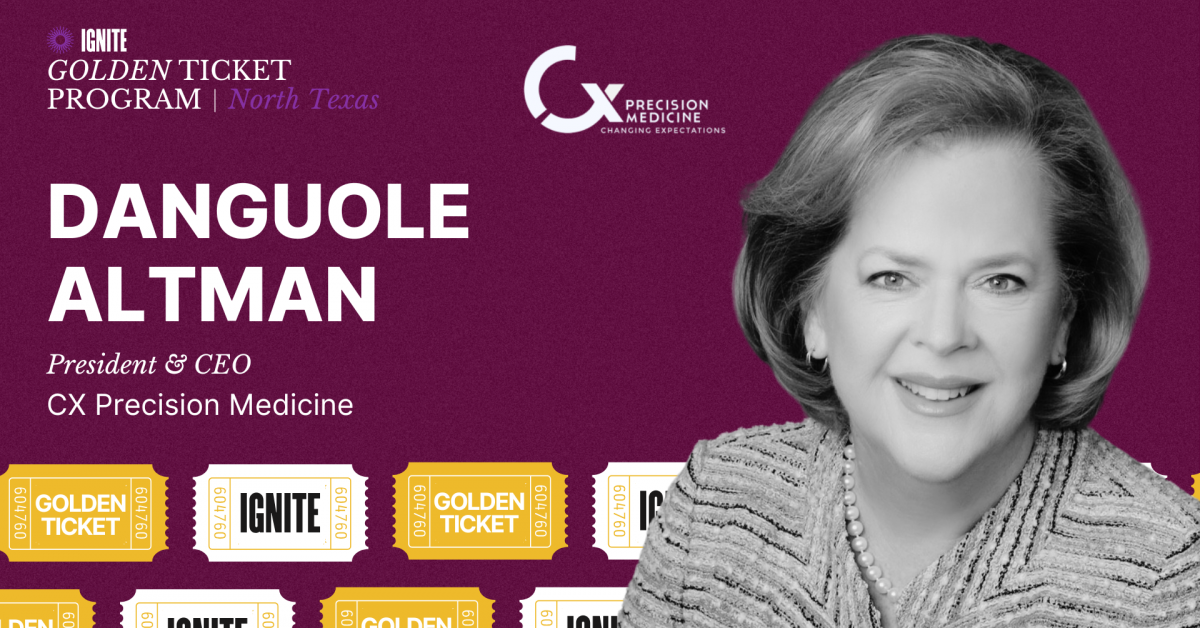
The Test That’s Turning Heads: How Danguole Altman Plans to Change Alzheimer’s Care
Written by Ananya Bhalla, Editorial And Content Lead at Ignite
When Danguole Altman left her last CEO role at Vapogenix, she assumed her time running companies had ended. After decades of leading healthcare organizations—consulting, launching ventures, and working with risk-bearing systems—she imagined her next chapter would involve a mix of advisory work, board seats, and consulting. But an unexpected call shifted her path.
A former colleague connected her with the investors behind CX Precision Medicine, a young company rooted in the research of Dr. Sid O’Bryant.
O’Bryant had spent more than a decade building one of the largest data sets in cognitive health research, laying the groundwork for a blood test that could help primary care doctors detect and manage cognitive decline far earlier than current standards allow. For Altman, the opportunity went beyond the science itself.
“Sid’s comprehensive and diverse data set ensured the test would work for women and men, and across different ethnic and socioeconomic groups. That commitment resonated with me, both personally and professionally,” she explains. “If a test isn’t equitable, it isn’t really precision medicine. That’s what drew me back into the CEO seat.”
The company’s mission also ties directly to the question that has driven Altman’s career: how to make America’s enormous healthcare system sustainable without sacrificing quality or access.
It’s a challenge she first encountered in her early consulting work at Lewin Associates, when rising healthcare costs were already causing alarm, and one she’s been addressing ever since—through policy analysis, leadership roles, and ventures like FemPartners and Vapogenix.
CX Precision presented a chance to take that challenge head-on through diagnostics that both lowered costs and improved outcomes.
Since stepping into the role, Altman has seen strong early validation.
In an independent, anonymous survey of primary care physicians, nearly 80 percent rated CX Precision’s blood test as “extremely valuable” to their practices. “Physicians, by nature, debate everything,” Altman says. “They’re trained to challenge, to look for exceptions and flaws. Seeing that level of consensus, even in a survey, was extraordinary. It told us we’re on the right track.”
Private conversations have only reinforced that perspective. Several senior leaders at companies already commercializing Alzheimer’s-related diagnostics have reviewed CX Precision’s data and shared their thoughts candidly with Altman: “This is exactly what we need. Nobody else is approaching the problem this way.”
Those quiet endorsements matter, especially in the early stages of building a company, when momentum can rise and fall on a weekly basis.
Altman is quick to note that steering a venture-stage company, particularly in healthcare, isn’t for the faint of heart. She often shares one story with founders—especially women—who hesitate to take the leap. “When I was raising money for FemPartners, I was two weeks postpartum, with Kleiner Perkins in my living room,” she recalls. “You can’t get bogged down by ‘I can’t’ or ‘I’m not the perfect candidate.’ If you’re holding the ball, you run with it. You figure it out as you go.” Her broader advice echoes the same theme: “Believe in yourself, and don’t take ‘no’ as the final answer. You don’t wait until you feel perfectly qualified—you rise to the occasion and move forward despite the doubts, your own or others’.”
Looking ahead, Altman sees the next five years as critical for CX Precision’s trajectory. The company plans to launch pilot programs with select physician groups to refine the product and gather the data needed to secure insurance reimbursement, particularly through Medicare. From there, scaling nationally will likely require strategic partnerships or licensing deals rather than building distribution alone.
“Funding is important, but relationships are everything,” she says. “That’s why Ignite is so valuable. Ayse and her team have built deep relationships with healthcare systems and leaders, both in Texas and across the country. We’re hoping to connect with the systems and leaders who can help us launch thoughtfully, avoid the pitfalls that sink rushed rollouts, and build a platform for sustainable growth.”
For Altman and Dr. O’Bryant, the ultimate goal isn’t just another diagnostic success story. It’s a shift in how cognitive health is managed—making early detection accessible, equitable, and sustainable so that both patients and the healthcare system benefit. “It’s in our name—CX precision is about changing expectations,” she says, “and finding solutions that transform the scope of medicine.”



